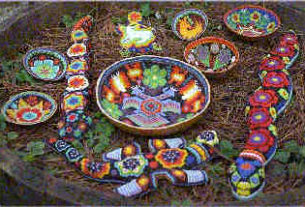I started to read this book expecting to hate it. However, I’m not going to end up saying I read it, and then loved it. Despite some pretty obvious problems, it was a bit better than I expected. The good thing about “Mexico” is that Michener has done enormous research in order to write it. The problem is that he hasn’t left out one single thing that he learned along the way. I have never read a book that is so stuffed full of information and where such an unwieldy plot has been devised in order to try and turn it into a novel.
I suppose when you get that famous and prolific, editors and publishers don’t have the nerve to edit you, or tell you you’re overdoing it. In any event, after wading through 646 pages of “Mexico”, I guarantee you’ll never catch this reader picking up “Alaska”, or “Poland”, or “Space”, even though, in fairness, there are some very interesting passages in “Mexico”.
Michener, in my humble opinion, has set himself an impossible task with this novel. He wants to cover 1,500 years of Mexican history, from every point of view – Indian, Spanish and American. So he has created a man, Norman Clay, who has Indian, Spanish and American blood in his family’s past. Norman is a photo-journalist with a U.S. magazine who is sent to Mexico to write about bullfighting. In the process he explores his family’s history. He’s still connected with the leading family in the town that he visits. This connection allows him entry into everything and anything. The town, by the way, is called Toledo but is really Guanajuato. God knows why Michener felt he had to change it. Anyway, the actual telling of all of this is so clumsy and awkward it simply doesn’t work. There’s a complete absence of any kind of smoothly flowing narrative.
It’s interesting to note that Michener wrote this novel in the ‘sixties, but it wasn’t published until 1992. I think the fact that he put it aside for thirty years tells us something about the author’s own attitude to the manuscript. What Michener has done in this book, is simply, to tell a bunch of stories: some set in Spain 500 years ago; some set in Mexico more than a thousand years ago; some set in present day Mexico; some set in Revolutionary America. Each has a common thread. One of Norman’s ancestors is a player in each story. As Norman has Indian, Spanish and American ancestors, this allows Michener to manipulate the slender threads that hold all of this together. At the same time, however, he seemingly can’t resist stuffing all his research into each of these narratives. It just doesn’t work.
The loose format however, does allow Michener to deliver opinions on a number of subjects. He tells us about human sacrifice practised by the Aztecs but reminds us, in some detail, that the Spanish Inquisition was no less gruesome. He gives us lengthy dissertations on Spanish poets and the Spanish preoccupation with death, as well as the American love of violence. He gives us a dissertation on how big money has affected both American basketball vs bullfighting. “In basketball nothing is honest,” a Mexican critic says. “Everything has been corrupted from the university president down to the home of the high school player. In bullfighting every human element has been corrupted. The difference is, the bull remains honest….”
At least a third of the book is concerned with bullfighting. The author knows a lot about that too, and wants to tell us everything. The descriptions of bullfights often seem interminable. I’ve never been to a bullfight. I’ve been checking lately and few of my friends here have been to bull fights. I never hear or read about bullfights. They’re just not really part of my consciousness of Mexico. Yet Michener obviously sees them as an integral and important part of the Mexican scene, as some sort of metaphor for the Mexican character.
“In Mexico they don’t regard bullfighting as a sport. It’s an art,” one character says. And another remarks: “I bought a book the other day that was supposed to be about bullfighting, but the outsider would have thought it was an essay on religion.”
Much of the research is interesting. But, as I said earlier, it just doesn’t all hang together as a single cohesive narrative.
Surprisingly, despite hundreds of pages devoted to bullfighting, Michener has almost nothing to say about the actual country that we all see right under our noses. In all those chapters about Aztec architects and Spanish conquerers and American adventurers and bullfighters and miners and missionaries and lovers, it’s as though one was reading about a Mexico that belonged only in history. There’s very little here about the country and the people as they are today. I’m told Michener knew and loved Mexico, but he writes as though his knowledge came only from books. It almost comes as a physical shock to read, on page 394, a small outburst, as follows:
“This was rural Mexico, almost as impoverished and ignored as the worst of what I had seen when reporting on Haiti. It infuriated me to know that the Mexican political party that had run the nation for most of this century had called itself something like the People’s Revolutionary Party and had loudly preached social justice for all, winning election after election on that windy promise, but when installed, had proved itself to be a callous oligarchy. A small group of buddies had passed the presidency from one to another, each coming into office with modest means and leaving after six years with hundreds of millions, usually hidden in Swiss banks. The so-called revolutionaries stole the country blind, allowing or even forcing the peasants to sink deeper and deeper into abject poverty. Few nations had been ruled so cynically, which was why so many peasants wanted to escape to the good jobs, houses and food in the United States.”
Michener goes on for a few more paragraphs in that vein – but that’s essentially it. Anyway, if you want to learn something about Mexico, this really isn’t the best place to start.
Verdict: An interesting failure.
Mexico
By James Michener
1992
Available from Amazon Books: Paperback -|- Hardcover -|- Audio Cassette



I was pleased to read your (Mr. Cogan’s) review of Michener’s book, Mexico. I am only on p. 138…so I don’t yet know if I can agree with your assessment of the author’s writing; although I did enjoy reading Poland – learned alot of history of that part of Europe that exerts an influence on the politics of today. However, in Mexico I think Michener wrote unnecessary detail about the behind-the-scenes of the life of bullfighting.